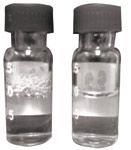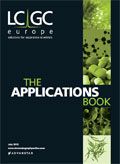Effective Cleanup and Analysis of Metronidazole from Foaming Facial Cleanser
Phenomenex Application Note
When working with complex matrices such as personal care products, sample preparation is perhaps the most difficult step of the analysis process. By utilizing a targeted sample preparation technique, such as ion-exchange SPE, analysis can be significantly improved as compared to less targeted techniques such as liquidliquid extraction. Our work successfully extracted metronidazole from foaming facial cleanser using a polymeric cation-exchange SPE sorbent, Strata™ -X-C, followed by a rapid LC–MS-MS analysis on a Kinetex® 2.6 µm XB-C18 HPLC/UHPLC core-shell column.
Materials and Methods
Sample Pretreatment:
1. Dissolve 0.250 g of foaming facial cleanser in 10 mL of 0.1 N HCl
2. Vortex until homogeneous
3. Centrifuge sample at 5000 g for 5 min
Solid-Phase Extraction (SPE)
The pretreated sample is further cleaned up and concentrated using SPE.
Cartridge: Strata-X-C, 30 mg/3 mL
Part No.: 8B-S029-TBJ
Condition: 1 mL methanol
Equilibrate: 1 mL 0.1 N HCl
Load: 3 mL of pretreated sample
Wash 1: 3 mL 0.1 N HCl
Wash 2: 3 mL methanol
Wash 3: 6 mL ethyl acetate
Dry: 5 min under full vacuum
Elute: 1 mL 5% NH4OH in methanol (v/v)
Dry down: Evaporate under a stream of nitrogen gas at 50 °C until dry
Reconstitute: Reconstitute samples with 200 µL of methanol/0.1% formic acid (10:90)
Results and Discussion
We were able to effectively extract metronidazole from foaming facial cleanser using a targeted SPE procedure on Strata-X-C polymeric SPE sorbent. The cation-exchange properties of the Strata-X-C SPE sorbent targeted the sp2 hybridized nitrogen at the 3 position of the imidazole ring in the metronidazole structure, forming a tight bond between the sorbent and the metronidazole compound. The strong interaction allowed a strong solvent wash of ethyl acetate to be performed which removed a significant amount of matrix interferences (Figure 1).

Figure 1: The vial on the left was not subjected to a strong organic wash and, therefore, contains matrix interferences such as foaming agents. After a strong ethyl acetate wash, matrix interferences are no longer present in the vial on the right.
Conclusion
By implementing a targeted SPE method, matrix interferences were significantly removed from a foaming facial cleanser matrix. This clean-up process allowed for a sensitive LC–MS-MS method that could detect metronidazole at low levels, down to 100 pg/mL. (Visit www.phenomenex.com/Application and search for Application No. 20631 for LC–MS-MS conditions).
Phenomenex Inc.
411 Madrid Avenue, Torrance, California 90501, USA
tel. +1 (310) 212-0555, +1 (310) 328-7768
Website: www.phenomenex.com

Distinguishing Alcohol- from Non-Alcohol-Associated Liver Cirrhosis with LC-MS
May 7th 2025A pilot study investigating whether nicotinamide adenine dinucleotide kinase (NADK) expression is selectively diminished in alcohol-associated liver cirrhosis (AC), as well as evaluating its potential as a biomarker for this condition, measured AC and non-AC (NAC). Nicotinamide adenine dinucleotide (NAD+) and nicotinamide adenine dinucleotide phosphate (NADP+) levels in human liver samples were measured using liquid chromatography-mass spectrometry (LC-MS).

.png&w=3840&q=75)

.png&w=3840&q=75)



.png&w=3840&q=75)



.png&w=3840&q=75)

















